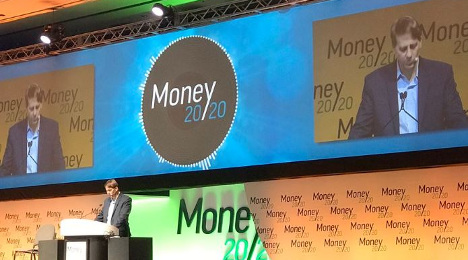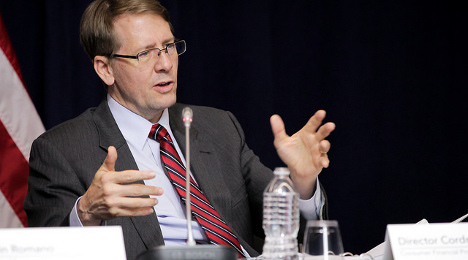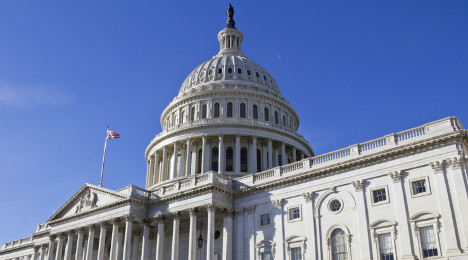A collection of 21 current and former federal lawmakers who might be considered the staunchest supporters of the Consumer Financial Protection Bureau filed an amicus brief on Tuesday asking the U.S. Court of Appeals for the District of Columbia Circuit to review its decision that in part called the “unconstitutionally structured.”
The group that included Sen. Elizabeth Warren, Rep. Nancy Pelosi —the U.S. House Minority Leader — as well as former Rep. Barney Frank declared in the brief that, “By concluding that the CFPB’s leadership structure is unconstitutional and severing the provision that made its director removable only for cause, the panel decision fundamentally altered the CFPB and hampered its ability to function as Congress intended. It also called into question the constitutionality of other regulatory agencies with similar structural features.
“For those reasons alone, this case involves a question of ‘exceptional importance’ that merits reconsideration by the en banc court,” the brief continued that’s available here and also signed by Sen. Sherrod Brown, who is ranking member of the Senate Banking Committee, along with Sen. Harry Reid, the outgoing Senate Minority Leader.
To recap, the matter began back in October when the U.S. Court of Appeals for the District of Columbia Circuit ruled in favor of a finance company that operates in the mortgage space, rescinding a $109 million enforcement action the bureau handed out nearly two years ago.
In writing for the 2-1 majority, U.S. Circuit Judge Brett Kavanaugh said, “In this case, the single-director structure of the CFPB represents a gross departure from settled historical practice. Never before has an independent agency exercising substantial executive authority been headed by just one person.
“The CFPB’s concentration of enormous executive power in a single, unaccountable, unchecked director not only departs from settled historical practice, but also poses a far greater risk of arbitrary decision-making and abuse of power, and a far greater threat to individual liberty, than does a multi-member independent agency,” Kavanaugh continued in the 110-page court document available here.
Speaking for the brief filers, Pelosi elaborated why the group made this move.
“Congress carefully designed the CFPB to elevate the interests of consumers above those of a well-heeled industry and provided for a single director removable for cause to ensure accountability and effectiveness,” Pelosi said.
“As the brief states, the DC Circuit should rehear this case en banc because last month’s decision by the DC Circuit panel was inconsistent with the Constitution and Supreme Court precedent,” she continued. “Under the Constitution, Congress has considerable latitude to shape the structure of independent agencies.
“We cannot allow financial interests to again offer abusive and predatory loans to consumers and precipitate another financial crisis,” Pelosi went on to say.
To all the auto financing executives and experts who came to Las Vegas for Used Car Week, we thank you for making this year’s SubPrime Forum and Re3 Conference the most engaging and successful industry gatherings Cherokee Media Group has hosted.
For segments of the auto financing community that couldn’t join us, here are some of the many highlights from the events:
—SubPrime Forum presenting sponsor Digital Recognition Network kicked off the discussion with an insightful and thought-provoking presentation by chief executive officer Chris Metaxas, who explained how critical location data can be not only during the recovery process, but also to enhance underwriting. Imagine knowing if the applicant actually spends significant time near the home and work addresses noted in the paperwork. Mitigating risk on the front end can help reduce the risk on the back end, according to DRN’s top executive.
—Experian Automotive’s Melinda Zabritski returned to the SubPrime Forum to share third-quarter data that was finalized just before she traveled to Las Vegas. Zabritski gave a rundown of the Q3 data that Experian will widely distribute soon in a presentation you can watch here.
—Whether it was during a presentation or networking times, the result of this year’s presidential election percolated throughout the session ballrooms and Used Car Week exhibit hall. Chris Stinebert, who oversees the American Financial Services Association, gave a wide-ranging recap of what’s ongoing within the Capitol Beltway. Stinebert touched on how regulations associated with auto financing, healthcare, taxes and more are likely to be modified when President Trump enters the White House. A portion of what Stinebert shared can be viewed here.
—And speaking of regulations, another cohort of auto finance executives and managers completed the National Automotive Finance Association’s Consumer Credit Compliance Certification Program in Las Vegas. More than 90 individuals finished the in-depth training offered by the NAF Association and orchestrated by Hudson Cook partners Patty Covington and Eric Johnson. It’s a program I’m looking to complete, too, as I detailed previously here and here. Throughout both the SubPrime Forum, which was put together in collaboration with the NAF Association, as well as the Re3 Conference sponsored by MBSi Corp., the importance of having trained employees and compliant service providers kept being repeated often by experts and other leaders in the field. The NAF Association is hosting another opening session of the certification program on Feb. 2-3. More details can be found at nafassociation.com.
—Cort DeHart of MBSi led one of the highest-attended sessions within the auto finance space. The Re3 Conference panel discussion focused on improving recoveries took on even higher importance as delinquencies and defaults tick higher as regulatory compliance demands intensify at an even greater rate.
—Along with the sessions already available online that I previously mentioned, Auto Remarketing senior editor Joe Overby also hosted several sessions that might be of interest to auto finance executives, too. Joe connected with Steve Kapusta of SmartAuction about how the wholesale market continues to evolve. Furthermore, our friends at the National Independent Automobile Dealers Association — who also played a huge role in making Used Car Week successful — recorded select sessions throughout Used Car Week, and those videos will be available online soon.
—You also might be able to see who from your firm — or the competition — traveled to Used Car Week via the wonderful photo gallery assembled by Cherokee Media Group photographer Jonathan Fredin, whose collection of images can be viewed here.
In summation, to the all of the attendees of Used Car Week, a sincere thank you for carving out time on your busy calendars to travel to Las Vegas — in some cases for the fifth, sixth or umpteenth time in 2016. We hope you found the content to be informative and useful, the resort to be comfortable and enjoyable and the networking time to be fruitful and productive. Mark your calendars now as the next Used Car Week returns to southern California; this time at the La Quinta Resort & Club, a Waldof Astoria Resort, in La Quinta, Calif., on Nov. 13-17, 2017.
Happy Thanksgiving to you and your family and friends!
Nick Zulovich is senior editor of SubPrime Auto Finance News and BHPH Report and can be reached at [email protected].
The historic result of Tuesday’s presidential election created rippling reactions throughout the financial services community, with many organization leaders looking forward to working with President-elect Donald Trump and a Republican-led Congress.
“I would say that just like the rest of the country, I was quite surprised by the results. The prognosticators in the media were really off. They didn’t seem to be tuned in to the realities of the electorate,” said Jack Tracey, executive director of the National Automotive Finance Association, which is a part of the upcoming SubPrime Forum that’s presented by Digital Recognition Network at Used Car Week.
“My reaction as an industry representative, now with a Republican president and both houses of Congress being Republican, I think there can be some legitimate constraints on the CFPB and their somewhat arbitrary rulings as well as a check and better oversight of that agency now,” Tracey continued during a brief conversation with SubPrime Auto Finance News. “I think that will be good for the industry because the industry can begin to deal with the agency not in a defensive mode but in a constructive mode.”
SubPrime Auto Finance News also reached Chris Stinebert, who is president and chief executive officer of the American Financial Services Association (AFSA). Stinebert is on tap to deliver the keynote presentation during a joint session of the SubPrime Forum and the Re3 Conference on Wednesday morning during Used Car Week at the Red Rock Resort in Las Vegas.
“Yesterday, the nation voted for change in Washington,” Stinebert said. “The election of Donald Trump along with majorities in the House and Senate foreshadow a major transformation of power which will impact everything from the composition of the Supreme Court to financial services.
“Auto dealers can anticipate new disruptions to their business — both good and bad,” he continued. “The impact of the election on federal and state regulations and enforcement on the used-car industry will be addressed at next week’s gathering.”
Leadership of the Consumer Bankers Association (CBA) took a similar position as the NAF Association and AFSA regarding the outcome of the 2016 presidential election.
“With a new president-elect and changes to the House and Senate, government and industry leaders have a chance to find workable solutions on issues most important to consumers,” CBA president and chief executive officer Richard Hunt said. “This is especially true for banking issues, as a strong banking sector is critical to a strong economy.
“CBA congratulates President-elect Donald Trump and will remain focused on working with members of congressional committees and federal agencies key to the financial services industry on our priorities, including a five-person, bipartisan commission at the Consumer Financial Protection Bureau; common sense policies to help banks innovate in the 21st century; and improving the regulatory environment so banks may continue to meet consumer needs,” Hunt continued.
“We encourage President-elect Trump to appoint experts willing to collaborate with industry counterparts from the retail banking industry,” he went on to say. “When we work together and consider all sides of the argument, we put people over partisan politics and stand a chance at strengthening the economy for all American consumers.”
Another leader in the banking sector also offered his cheers for Trump’s victory.
“We congratulate Donald Trump on his election as the 45th president of the United States and all other winners of last night’s election. ABA is eager to work with the new administration and the 115th Congress to achieve our shared goals for a vibrant and growing economy. American Bankers Association president and CEO Rob Nichols said.
“We call on the administration and Congress to come together and work for the common good,” Nichols continued. “We look forward to working with members of both parties on policy solutions that will allow banks to help accelerate economic growth, create jobs, better serve their local communities, and help their customers and clients succeed.”
The Financial Services Roundtable, which claims to represents the largest integrated financial services companies providing banking, insurance, payment and investment products and services to the American consumer, is urging Trump to act swiftly to enact policies to improve the economy, grow good-paying jobs, encourage innovation, and protect both consumers and taxpayers.
“Our country faces big challenges, but it also has incredible opportunities for innovation and growth that will provide a brighter future for people who need hope and help,” said FSR chief executive officer Tim Pawlenty, who previously made a run for the White House. “The new administration and Congress should enact policies that grow the economy, spur innovation, protect both consumers and taxpayers, add good-paying jobs, and help more Americans reach their financial goals.”
FSR advocates before policymakers in Washington and is a non-partisan organization that does not endorse any candidate or political party. FSR’s priorities for 2017 include:
—FinTech policy and collaboration
—Federal regulatory transparency
—Housing finance reform
—Tax reform
—Cybersecurity
—Trade
—Retirement Security Policy
—Insurance capital standards and flood insurance
Stifel Nicolaus chief economist Lindsey Piegza shared her assessment from the perspective of the customers who might already hold vehicle installment contracts or who are scouring vehicle inventory considering a purchase.
“Shock. Shock was the general tone of the media and the talking heads in reaction to last night's presidential election resulting in a conclusion opposite of the national polls,” Piegza said. “Now many have long assigned a level of legitimacy to national polls equivalent to those calling for Punxsutawney Phil to see his shadow, but coupled with the lack of predictive power ahead of the Brexit, (Tuesday night’s) Republican victory, for many, at least at this point, renders national polls virtually worthless.
“Polling legitimacy aside, the American people have spoken, electing Donald Trump, a Washington outsider, the 45th American president. In an electoral vote 276 to 218, the policies of the past propelled voters to the polls in search of an anti-establishment platform in what many are calling a ‘stunning victory,’” she continued. “In other words, Trump now faces a heightened expectation of change and progress against the backdrop of stagnant economic activity, waning income growth and a growing divergence among ‘class lines.’”
According to the Consumer Financial Protection Bureau’s monthly complaint snapshot released this week, the CFPB has handled approximately 1,008,500 complaints across all products as of Oct. 1.
Bureau officials indicated debt collection remained the most-complained-about financial product or service. Of the approximately 26,000 complaints handled in September, there were 7,352 complaints about debt collection.
The second most-complained-about consumer product was credit reporting, which accounted for 4,715 complaints. The third most-complained-about financial product or service was mortgages, accounting for 4,501 complaints.
In a year-to-year comparison examining the three-month time period of July to September, student loan complaints showed the greatest increase — 96 percent — of any product or service. The bureau received 1,248 student loan complaints between July and September, while it received 638 complaints during the same time period in 2015.
Officials determined New Mexico, Colorado and Wyoming experienced the greatest year-to-year complaint volume increases from the July-to-September period versus the same time period 12 months earlier. New Mexico was up 28 percent, and Colorado and Wyoming up 24 percent.
The CFPB also mentioned the top three companies that received the most complaints from July through September were credit reporting companies Equifax, Experian and TransUnion.
The CFPB also drilled down and offered more data about activity from consumers in North Carolina.
The bureau reported consumers from the Tar Heel State have submitted 27,600 of the 1,008,500 complaints the CFPB has handled as of Oct. 1, with 8,000 of them coming from the Charlotte metro area.
Complaints related to debt collection accounted for 25 percent of all complaints submitted by consumers from North Carolina and 26 percent of complaints from Charlotte. This is slightly lower than the rate at which consumers nationally submit debt collection complaints to the CFPB — 27 percent.
Complaints related to mortgages accounted for 26 percent of all complaints submitted by consumers from North Carolina and 27 percent of complaints from Charlotte. This is slightly higher than the rate at which consumers nationally submit mortgage complaints to the CFPB — 25 percent.
In the August 2015 to July 2016 time period, the three most-complained-about companies by consumers from North Carolina were Equifax, Wells Fargo and Bank of America.
Consumer Financial Protection Bureau director Richard Cordray generated attention on Monday, and this time it wasn’t connected with an enforcement action and millions of dollars in restitution and fines.
Rather, Cordray shared some insight about an endeavor called Project Catalyst, a 4-year-old effort that contains some components that might pique the interest of the auto finance community.
Cordray made a presentation during Money20/20, which organizers say is the “world’s biggest, boldest and best event covering payments and financial services innovation for connected commerce at the intersection of mobile, retail, marketing services, data and technology.” With about 10,000 attendees gathering for the event in Las Vegas, Cordray explained Project Catalyst has concentrated on encouraging development within payments, transactions, lending, underwriting, budgeting, money management and other areas, too.
Corday noted that one portion of the project is dubbed “Office Hours,” where bureau officials connect with a wide array of developers and other industry players.
Next, the director touched on what might be considered the opposite of how the CFPB typically operates as Cordray described the bureau’s “no-action letter” policy.
“We recognize that companies may be uncertain about how existing regulations apply to novel products that do not fit neatly within the regulatory structure,” Cordray told conference attendees.
“Under our ‘no-action letter’ policy, if CFPB staff is persuaded that a particular product holds promise for consumers and is structured in a way to mitigate risks to consumers, but is held back by regulatory uncertainty, the staff can issue a no-action letter to the company stating that we have no intent to initiate supervisory or enforcement action based on those particular innovations for a defined period,” he continued.
Furthermore, Cordray referenced another component that could be especially interesting to auto finance companies, especially operations that delve into the subprime space.
The bureau estimated that roughly 45 million Americans have either no credit history, or credit history that is too scarce or too stale to generate a credit score. Through Project Catalyst, the CFPB noted that it has learned that a number of innovators are seeking to expand responsible access to credit. Some companies are exploring opportunities to expand access by looking to alternative forms of data and newer methods of analyzing this data to assess an applicant’s creditworthiness.
“We have met with a number of innovators that seek to expand access to credit by looking to alternative forms of data and newer methods — such as machine learning — of analyzing this data to assess creditworthiness. They say they want to do this in compliance with the consumer financial laws, including the fair lending laws, but are unsure how to do so,” Cordray said.
“Through Project Catalyst’s program, bureau staff can consider issuing a no-action letter to foster access and innovation,” he went on to say. “We welcome a dialogue with anyone who is facing this sort of challenge in expanding access to credit.”
In a separate announcement about Project Catalyst, the bureau also mentioned that it has learned of firms that are developing tools to improve consumer engagement around credit reporting and address issues around accuracy and understanding. For example, officials highlighted one company is streamlining the process for consumers to dispute errors on their credit reports. Others model actions consumers might take to improve their credit standing. Increasingly, companies are also offering consumers more information about their credit scores and credit reports on a regular basis.
Near the end of his prepared remarks, Cordray touched on a practice that has landed some finance companies in trouble — third parties accessing consumer information. He emphasized how that process, when executed properly, is a key element in product development.
“Many exciting products we see through the lens of Project Catalyst depend on consumers permitting companies to access their financial data from financial providers with whom the consumer does business,” Cordray said. “We recognize that such access can raise various issues, but we are gravely concerned by reports that some financial institutions are looking for ways to limit, or even shut off, access to financial data rather than exploring ways to make sure that such access, once granted, is safe and secure.
“Let me state the matter as clearly as I can here: We believe consumers should be able to access this information and give their permission for third-party companies to access this information as well,” he continued. “In the Dodd-Frank Act, Congress likewise stated that, subject to regulations issued by the bureau, consumers should be able to access information maintained by a financial provider about the consumer’s use of their products.
“Congress also specified that the information ‘shall be made available in an electronic form usable by consumers.’ We look forward to productive engagement with all stakeholders on this topic to find solutions that put consumer interests first,” Cordray went on to say.
The CFPB’s complete report about Project Catalyst can be downloaded here.
Automotive Compliance Consultants advised dealerships to remain vigilant and attentive to consumer business practices even though the U.S. Court of Appeals recently ruled the leadership structure of the Consumer Financial Protection Bureau is unconstitutional.
“The CFPB has been the biggest regulatory bully in D.C. without shame, and with a total disregard for Congress and elected officials. In its wrangling with the auto industry, in particular, Ally Financial and other auto finance companies, the CFPB clarified that you either settle with them on their terms, or suffer the consequences if you fight,” said David Missimer, general counsel for Automotive Compliance Consultants.
Missimer insisted the CFPB has made it a priority to eliminate dealers' ability to discount the APR, and continues to look for a way to affect the sale of ancillary products out of the dealership. He continued that agencies having direct jurisdiction over dealers have noticed the CFPB’s success and tactics.
He added that regulators are looking at the disclosures dealerships provide at the time of sale and are very much interested in the F&I products being sold.
Perhaps a reprieve is in the wind if this case is upheld, but Missimer cautioned dealers to remain observant and committed to consumer financing best practices.
Earlier this month, the U.S. Court of Appeals in PHH Corp. versus Consumer Financial Protection Bureau made rulings in the case that were beneficial to PHH and relevant to those watching the CFPB, says Missimer, a member of the National Association of Dealer Counsel, American Financial Services Association and National Automotive Finance Association.
• It held that the CFPB is unconstitutionally structured. With the "for cause" provision severed, the president now will have the power to remove the director at will and to supervise and direct the director. “This ruling, though,” Missimer said, “may have no teeth depending on the outcome of the upcoming election.”
• CFPB will now have to abide by the statute of limitations in all CFPB enforcement actions — the bureau had insisted that under Dodd-Frank, the law that authorized it, there were no limitations for any CFPB administrative actions.
“Should the ruling stand, it will make a significant dent in the agency’s no-prisoners approach to reviewing corporate conduct well outside any relevant statute of limitations, and demanding redress for the same,” Missimer said.
“For dealers, the message is that although the ruling is significant, it does nothing to change the agency’s determination to terminate, or severely limit dealer reserve. Sound consumer financing practices and use of documented processes and practices continue to be a must to protect the dealership,” he went on to say.
Automotive Compliance Consultants specializes in dealership and auto finance compliance, providing in-dealership consultations and analysis, compliance audits and training, and offers solutions for all compliance needs. The Automotive Compliance Consultants staff has extensive experience in the automotive retail industry and focuses exclusively on dealership compliance issues.
For information, contact Missimer at [email protected] or visit www.compliantnow.com.
More industry reaction percolated stemming from Tuesday’s decision by the U.S. Court of Appeals for the District of Columbia Circuit involving the Consumer Financial Protection Bureau, which on the same day handed out a $28.5 million enforcement action against Navy Federal Credit Union for what the regulator deemed to be improper debt collection actions.
To recap, a panel of three of the appeals court’s judges ruled in favor of a finance company that operates in the mortgage space, rescinding a $109 million enforcement action the bureau handed out nearly two years ago while calling the CFPB “unconstitutionally structured.”
After combing through the particulars of the 2-1 decision, three members of Clark Hill's Consumer Financial Services Regulatory & Compliance Practice Group shared an assessment that might lift executives and managers discouraged by the bureau operates.
In a commentary written by Thomas Brooks, Jane Luxton and Joann Needleman, they said the decision “may provide the financial services industry some comfort to challenge the bureau or force the bureau to be more thoughtful in its approach, but many consent orders are already in place, and stipulations of judgment in civil actions brought by the bureau have been entered by agreement of all parties.
“It is difficult to know what impact the court’s ruling will have on pending rulemakings on payday lending and those in the pipeline on arbitration and debt collection practices,” they continued in the assessment available here.
“In the near term, it seems likely that the bureau will seek rehearing from the full D.C. Circuit, given the signal importance of the decision. And there is little question that these developments will re-invigorate the calls to reform the CFPB, with strong views on all sides of the issue,” they went on to say.
Within hours of the appeals court announcement, the CFPB handed out its latest enforcement action. Bureau officials said they took action against Navy Federal Credit Union for “making false threats” about debt collection to its members, which include active-duty military, retired servicemembers and their families.
The bureau determined the credit union also unfairly restricted account access when members had a delinquent loan. According to the CFPB’s news release, Navy Federal Credit Union is correcting its debt collection practices and will pay roughly $23 million in redress to victims along with a civil money penalty of $5.5 million.
“Navy Federal Credit Union misled its members about its debt collection practices and froze consumers out from their own accounts,” CFPB Director Richard Cordray said. “Financial institutions have a right to collect money that is due to them, but they must comply with federal laws as they do so.”
The CFPB investigation found that Navy Federal Credit Union deceived consumers to get them to pay delinquent accounts. The bureau insisted the credit union falsely threatened severe actions when, in fact, it seldom took such actions or did not have authorization to take them.
The bureau also determined the credit union also cut off members’ electronic access to their accounts and bank cards if they did not pay overdue loans. Hundreds of thousands of consumers were affected by these practices, which occurred between January 2013 and July 2015.
As Clark Hill referenced, future actions like what the CFPB just took against Navy Federal Credit Union might be changing because of Tuesday’s appeal court ruling, which can be reviewed here. Writing for the majority, U.S. Circuit Judge Brett Kavanaugh gave what some observers might consider to be a scathing assessment of the bureau, which the Consumer Bankers Association found when it reviewed the ruling
“In short, when measured in terms of unilateral power, the director of the CFPB is the single most powerful official in the entire U.S. Government, other than the president," the court said. "Indeed, within his jurisdiction, the director of the CFPB can be considered even more powerful than the president. It is the director’s view of consumer protection law that prevails over all others. In essence, the director is the president of consumer finance."
Laurence Platt, a partner in Mayer Brown’s Washington, D.C., office and a member of the firm’s consumer financial services group, described the decision as being more of a “sweep” than the Boston Red Sox being ushered out of the Major League Baseball playoffs.
According to Platt, “For those who think that CFPB’s Richard Cordray has unbridled powers as the sole director of the CFPB, the U.S. Court of Appeals for the District of Columbia Circuit just proved otherwise in today’s highly anticipated decision involving PHH Corp.
“In a stinging rebuke to the CFPB, the court repudiated a key feature of the single director structure of the CFPB as well as the CFPB’s interpretations of a consumer credit law that it enforces,” Platt continued. “It sought to cure the purported flaw in the CFPB’s structure by providing that the director of the CFPB is subject to the supervision, direction and removal at will by the president of the United States. As written, the CFPB’s director is insulated from interference by the president and only can be terminated with cause.
“It’s a bigger sweep than the Cleveland Indians beating the Red Sox in three games to none,” he went on to say.
The Consumer Financial Protection Bureau made it official this week. As of the reading stemming from its September update, the bureau now has handled more than 1 million consumer complaints.
"Since opening our doors in 2011, we have handled over 1 million complaints from consumers about their problems with financial products and services,” CFPB director Richard Cordray said in the press release distributed by the bureau announcing the new figure. “Not only have we achieved substantial relief for consumers, but hearing directly from consumers is fundamental to our mission.
“We can better protect all consumers because of what we learn from those who have submitted complaints and shared their experiences with us,” Cordray continued.
Some of the findings from the statistics being published in this month’s snapshot report include:
—Complaint volume: For August, the CFPB reported debt collection was the most-complained-about financial product or service. Of the 28,651 complaints the bureau handled in July, there were 9,746 complaints about debt collection.
The second most-complained-about consumer product was credit reporting, which accounted for 5,123 complaints. The third most-complained-about financial product or service was mortgages, accounting for 4,310 complaints.
—Product trends: In a month-to-month comparison, officials indicated complaints about debt collection submitted to the bureau rose 50 percent between July and August. While there were 6,488 debt collection complaints submitted to the bureau in July, the CFPB received 9,746 debt collection complaints during August.
—State information: The CFPB determined Maine, Nebraska and Idaho experienced the greatest year-to-year complaint volume decreases from June to August period versus the same time period 12 months before, with Maine down 36 percent, Nebraska down 19 percent, and Idaho down 15 percent.
—Most-complained-about companies: The top three companies that received the most complaints from April through June were credit reporting companies Equifax, Experian and TransUnion.
When the bureau opened its doors in July 2011, it began accepting credit card complaints submitted by consumers online, over the phone, and through the mail. Since then, the bureau has continually expanded its complaint handling to include a wide variety of financial products and services including mortgages, bank accounts, debt collection and more.
Officials reiterated that the now more than 1 million complaints handled by the CFPB has resulted in millions of dollars in monetary relief to consumers as well as non-monetary relief, such as cleaning up credit reports or correcting the terms of a loan.
Cordray emphasized how the CFPB will punish financial institutions when it finds wrongdoing. The director made the points again when he spoke before the U.S. Senate Banking Committee last week in a hearing recapping the recent actions taken against Wells Fargo not related to auto financing. Earlier this month, the CFPB fined the bank $100 million for what the regulator deemed to be “widespread illegal practice of secretly opening unauthorized deposit and credit card accounts.”
Spurred by sales targets and compensation incentives, the bureau said employees boosted sales figures by “covertly” opening accounts and funding them by transferring funds from consumers’ authorized accounts without their knowledge or consent, often racking up fees or other charges.
According to the bank’s own analysis, the CFPB found employees opened more than 2 million deposit and credit card accounts that may not have been authorized by consumers.
Officials said Wells Fargo will pay full restitution to all victims and a $100 million fine to the CFPB’s Civil Penalty Fund. The bank will also pay an additional $35 million penalty to the Office of the Comptroller of the Currency, and another $50 million to the city and county of Los Angeles.
“This action should serve notice to the entire industry,” Cordray told the Senate committee. “If sales targets and incentive compensation schemes are implemented in ways that threaten harm to consumers and lead to violations of the law, then banks and other financial companies will be held accountable.
“We have seen the risk that such programs pose to consumers across the entire financial sector — in debt collection, mortgage origination, credit card add-on products, overdraft products, and now in this action,” he continued. “Any such initiatives should be carefully monitored as a basic element in a company’s compliance program.”
Patty Covington cautioned me beforehand that the opening module of the National Automotive Finance Association’s Consumer Credit Compliance Certification Program would be like drinking from a firehose. Well, she didn’t exaggerate.
However, the way she and fellow instructor Eric Johnson delivered the material left me and the rest of the more than 100 students thirsty for more.
We all gathered this past week in Plano, Texas, for the program’s first in-person segment, delving into hundreds of pages of regulatory material accompanied by dozens of links to online sources. The Equal Opportunity Credit Act. The Gramm-Leach-Bliley Act. The Fair Credit Reporting Act. The instructors and Hudson Cook partners easily could have spent the two days we had together focused on just one of those topics. But we all know federal agencies have many tools in their regulatory chest, so the introductions to these rules had to be brisk.
Then there are all the acronyms. For example, UDAP and UDAAP. One letter makes a profound difference in creating “unfair and deceptive acts and practices” as well as “unfair, deceptive and ABUSIVE acts and practices.”
And missteps in those areas can cost your finance company thousands of dollars in fines, if not more. Use the search box on our website and enter the term “consent decree” to find out what kind of actions agencies such as the Consumer Financial Protection Bureau and the Federal Trade Commission have taken.
Oh yes, there are state regulators, too. They bring along statutes with definitions that can vary as much as the landscape in New Mexico versus Maine.
So when the NAF Association or industry partners such as we here at SubPrime Auto Finance News often repeat the importance of maintaining compliance, it’s not because we don’t have any other matters to discuss. It’s about maintaining survival.
Patty and Eric didn’t sugarcoat the current compliance landscape to our class, which included employees of finance companies and service providers as well as attorneys looking for continuing education and buy-here, pay-here dealers seeking information. They took a straightforward approach, summarizing information nicely while keeping attendees engaged.
In the coming days, I and the rest of the class must complete and pass the first-module exam with a score that’s much higher than the average year-round temperature in San Diego. Then two more online segments are to follow before the final segment that’s also a face-to-face time. Later this fall, the NAF Association hosts its next in-person module, which happens to coincide with Used Car Week at the Red Rock Resort and Casino in Las Vegas on Nov. 14-18.
Program students who are in town to complete the NAF Association compliance program also will receive complimentary registration for the SubPrime Forum, which is our industry gathering for finance company executives to discuss trends, best practices and more.
For industry managers who are unsure if the investment in this compliance program is worth it, let me offer this consideration. If a regulator determines your company KNOWINGLY disobeyed certain acts or perhaps was abusive to a customer, the penalty can surpass $1 million per INCIDENT. How many active accounts are in your portfolio? I can assure you the cost of the NAF Association’s program is a fraction of that potential figure.
The NAF Association is likely to host another opening module for industry professionals who missed last week’s opportunity. Contact the association through its website at www.nafassociation.com for more details.
For now, I have plenty of studying to do.
Nick Zulovich is the senior editor of SubPrime Auto Finance News and is sharing updates about his journey to through the NAF Association’s Consumer Credit Compliance Certification Program. He can be reached at [email protected].
In a moved cheered by a wide array of organizations including the Consumer Bankers Association and the Independent Community Bankers of America, the U.S. House Financial Services Committee passed what Republican lawmakers are touting as an alternative to the Dodd-Frank Act.
The Financial CHOICE Act moved forward by a partisan vote of 30-26 on Tuesday, generating opposite reactions from lawmakers on either side of the aisle. Financial Services Committee chairman and sponsor of the bill Jeb Hensarling said, “Democrats just voted against a bill that increases penalties against those who commit financial fraud.
“They just voted against a bill that ends taxpayer-funded bailouts, and they just voted against legislation that provides relief from Washington’s crushing regulatory burden for small banks, credit unions and consumers,” continued Hensarling, a Texas Republican who spelled out the measure earlier this summer.
“The bill holds Wall Street accountable with the toughest, strongest, strictest penalties ever — far greater than those in Dodd-Frank,” Hensarling went on to say. “And as recent headlines attest, obviously stronger penalties are needed. It requires banks to be well capitalized to prevent another financial crisis and puts in place the toughest penalties in history to protect consumers from fraud and deception.
Meanwhile, the committee’s ranking member, Rep. Maxine Waters of California, chastised Republicans for how the measure moved ahead.
“This bill is so bad that it simply cannot be fixed. This markup is not a serious attempt to move thoughtful legislation, evidenced by the fact that we only had one hearing on one portion of the bill,” Waters said.
“It’s clear that this is a rushed, partisan messaging tool, though why anyone would want to push legislation to deregulate Wall Street at a time like this is beyond me,” she added.
Despite what lawmakers volleyed at each other, industry representatives whose interests can include auto financing applauded this week’s actions.
“CBA welcomes the House Financial Services Committee’s efforts in reforming Dodd-Frank. Consumers will benefit greatly from the creation of a five-person, bipartisan board at the CFPB, which will preserve the bureau as a strong, stable and effective regulator, regardless of a President Trump or Clinton,” said Richard Hunt, who is the Consumer Bankers Association’s president and chief executive officer.
“Additionally, the repeal of the Durbin Amendment, which has limited consumer access to many affordable banking products and services through a mandated price control, is a major win for consumers,” Hunt continued.
Independent Community Bankers of America president and CEO Camden Fine took a similar position regarding committee passage of the Financial CHOICE Act.
“ICBA congratulates the House Financial Services Committee for advancing the Financial CHOICE Act. Chairman Jeb Hensarling’s bill is an important source of meaningful regulatory relief that will help community banks foster economic and job growth in their local communities,” Fine said.
“The Financial CHOICE Act includes many common-sense provisions from ICBA’s Plan for Prosperity platform to reform community bank overregulation and enhance our economy,” Fine continued. “These provisions include a repeal of Durbin Amendment price controls on debit card interchange, common-sense reforms to excessively burdensome mortgage-lending rules, and relief from unnecessary call report and data-collection requirements.
“ICBA looks forward to continuing to work with chairman Hensarling and other members of Congress to advance much-needed and robust regulatory relief that will benefit the nation’s consumers and economy,” Fine went on to say.
Other organizations that welcomed the House action included the U.S. Chamber of Commerce, Americans for Prosperity, Small Business Investor Alliance, Small Business & Entrepreneurship Council and the Mid-Size Bank Coalition of America.












